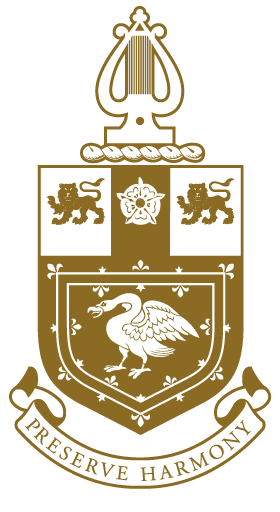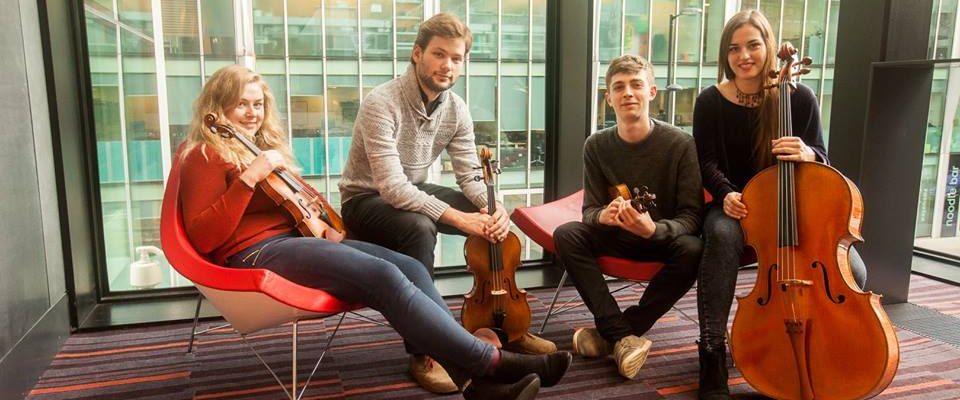Young Artist Interview: Chatting about all things opera with mezzo-soprano Ema Nikolovska
Canadian-Macedonian mezzo-soprano Ema Nikolovska is a multi-award winning artist on the GSMD Opera Course (2018-2020). A BBC new generation artist and YCAT artist, Ema recently made her Wigmore debut following her Musicians’ Company 2018 Silver Medal – GSMD win.
Have you always dreamed of being an opera singer?
No, being a classical singer is only something I’ve aspired to in the past four years. I always thought I would be a violinist (I started lessons at four years old), and I completed an undergraduate degree in violin. I took voice lessons from the age of sixteen as a fun complement to my violin studies, but as I became more advanced, enjoying the working process of singing, and as I began to feel like a life in violin wasn’t quite the right fit for me, I had the gut feeling I’d be happier as a singer, so I devoted myself to that full-time since I graduated from my degree in May 2015.
How has growing up Macedonian and Canadian influenced your singing?
It was fascinating to experience two cultures simultaneously while growing up in Canada. I was born in Skopje, Macedonia, and at one year old immigrated with my parents to Toronto. I didn’t know English when I started kindergarten, but eventually English became the language I’d use most frequently, while always speaking Macedonian at home and with other Balkan families. It’s beautiful to feel this kind of dualism, to inhabit the energies of my culture at home and then the larger culture of being at school, and then in a broader sense, to experience the different cultures of my friends and their families. This fed my curiosity for the sound worlds of different languages, the fascination with different customs, psychologies, and folk music. I think this informs my view of music and sound as a vast universe, which, as we continue to explore it, feeds our personal database of sound and imagination, and that in turn subconsciously (or even consciously) influences the choices we make in performance, the risks we take, and the importance of tuning in to our curiosity and following it.
What has been your favourite performance to date?
There are too many to choose from! I’d say that any performance I do is my favourite at that moment, because as a performer one needs to find ways to love and enjoy any story-telling situation. However, to give some specific examples: I loved performing at the Guildhall Gold Medal in May, both the piano and orchestra rounds – the audience was so energetic and generous, the orchestra was brilliant, and I learned so much about inhabiting a space and a sound from rehearsing and performing with the orchestra, and conductor Richard Farnes.
A huge career highlight so far was performing with Malcolm Martineau in a Schubert recital this past January in Berlin’s Pierre Boulez Saal – words are not enough to describe how profoundly that experience influenced me. Malcolm is one of my favourite artists, and I learned multitudes from our rehearsals and performance; subtle concepts that one perhaps feels more than talks about. He is such a beautiful, generous and imaginative person and artist – those few days in Berlin I’ll always carry in my heart and I often think about them when I need motivation or inspiration.
Other highlights from the past few months have been the Leeds Lieder Gala in Wigmore Hall in June (a line-up of incredible musicians I greatly admire, and an evening based on songs set to Shakespeare texts!), performing in the Kathleen Ferrier Awards Semifinal and Final in April with my duo partner Gary Beecher, and of course my Wigmore debut recital with duo partner Dylan Perez in May! The first international competition I did was last September in Vienna with duo partner Michael Sikich, and that was also an exhilarating experience, to share Lieder with an eager and open audience, and to be recognised for our adventures in music and poetry. I am very lucky and grateful to have such astounding duo partners in Michael, Gary and Dylan, and our artistic relationships are extremely fulfilling, giving us such a sense of joy in collaboration and exploring our programming ideas.
Throughout the past school year, I felt I’ve grown immensely from the end of term scenes on the Guildhall Opera Course – each set of scenes, in December, March and July, has been exciting, challenging, and among my most favourite musical experiences. I love my colleagues on the course, who are so supportive, vibrant and inspiring, and also our incredible professors and directors – we all encourage and learn from one another and I think together we’ve grown into discoveries we could not have imagined before we started the course this past September. I am so looking forward to our next year together in which we will present a Haydn opera and a commission by composer Lliam Paterson!
How did it feel to perform at Wigmore Hall?
Every time I perform in Wigmore feels like the first time – it is a constant state of awe that stays with you long after the concert is over. Honestly, Wigmore is one of my favourite places in the world, where I have spent some of the most moving afternoons or evenings, and it always feels like home. There is also an enormous feeling of gratitude to be there either making music or listening, to absorb the legacy of that space, and to work with all the wonderful people who run the venue and look after the performers and audiences. The recital I performed with my duo partner Dylan Perez on 18 May was particularly special, as Dylan was the first pianist I worked and performed with when I arrived at Guildhall in September 2016 – we even included some Medtner songs on the programme which were from our first Guildhall project, so it all felt like a full-circle event. Our families were there, our amazing friends and colleagues from London and afar, and two of my voice professors, Helga Tucker (my first voice teacher, who travelled from Toronto) and Rudolf Piernay, my current professor, so it was a collision of worlds, a culmination of our work, and a very emotional evening!
Which roles for mezzo-soprano are on your bucket list?
The Rape of Lucretia is one of my favourite operas, so it would be a dream to perform Lucretia one day! The Cunning Little Vixen is another favourite, so I’d love to sing the Fox in that. Trouser roles have always captivated me, and I love the array of intense personalities one can experience through them, so more on the wish-list would include Nerone, Ariodante, Giulio Cesare, Octavian from Der Rosenkavalier, Der Komponist from Ariadne auf Naxos, Sesto from La Clemenza di Tito.
What upcoming performances or recordings are you most looking forward to?
I’ll soon be on my way to Switzerland for the Verbier Festival Academy, so I’m looking forward to spending three weeks in the song programme performing in masterclasses and concerts. Then for ten days in August I’ll be part of the Dialogue XI Symposium in Finland led by Kaija Saariaho and Anssi Karttunen, working with four composers on their new pieces written specially for the symposium. On 30 August I’ll perform a recital in Glenarm with Joseph Middleton – an all-French song programme which will be broadcast by BBC Radio 3. And the big projects in the fall will be the Guildhall Opera Course production of Haydn’s La fedeltà premiata, in which I will play the role of Celia, directed by Stephen Barlow, conducted by Alice Farnham. And 20-24 November I’ll be in s’Hertogenbosch with my duo partner Michael Sikich for the International Vocal Competition for Lied duo; we also plan to go to Paris in December for the Nadia and Lili Boulanger Duo Competition.
Where would you like to take your career?
Both opera and art song are important parts of my musical life, so I would like to contribute what I can to honouring their traditions, and supporting ideas and new work which will take these forms in different and daring directions. It is important to me to straddle the worlds of traditionalism and innovation, and to find ways of creating dialogue between them – I think more exciting discoveries can be made through juxtaposition. I am very passionate about creative programming and researching song repertoire which is rarely heard, so I’d like to bring new sounds and ideas to audiences through my research, and also commission new writing from composers and poets. I’d like to support my colleagues in the theatre and beyond who are doing wonderful work, and to be part of creating new operas. What drives my work is a desire and curiosity to always be learning, and to learn as much as I can about the human voice and its possibilities across genres, languages, and media.
Ultimately, the stage is not the only professional end goal; I believe as musicians we have a responsibility to our communities to encourage engagement with creativity and live performance, so I’d like to use my knowledge to create initiatives that will have significant impact on public music education, as well as influence audiences’ personal listening practices to include as wide a range of music as possible in their lives (there’s nothing wrong with having personal preferences, I just believe that there is something anyone can appreciate within any genre of music, and trying something new or challenging can influence the way we experience the things we already like, and how we think in general). Those are some ambitious concepts which aren’t yet fully formed, but I hope that as I continue to work and meet new colleagues, the knowledge and experience which builds up over the next few decades will shape these dreams.
You can find out more about Ema on her Company Yeoman profile and on twitter @EmaNikolovska.
Interview by @suzywillmott





